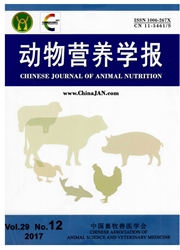

 中文摘要:
中文摘要:
本文旨在研究散养方式下不同产蛋阶段饲粮粗蛋白质水平对北京油鸡产蛋性能及蛋品质的影响。选取600只体重无显著差异的19周龄北京油鸡蛋鸡,随机分为6组(组1~6),每组100只,均饲以玉米-豆粕型基础饲粮,饲养在专门新建的散养鸡舍内。组1~3进行产蛋前期(19~21周)试验,组4~6进行产蛋中期(22~43周)试验,组1~3继续进行产蛋后期(44~55周)试验。组1和组4为各阶段对照组。每阶段均采取单因素设计,粗蛋白质水平分别为16.0%、15.5%和15.0%。测定每阶段内各组平均采食量、产蛋率、料蛋比、死淘率,以及产蛋中期、后期的鸡蛋品质。结果表明:在散养条件下,不同阶段饲粮粗蛋白质水平对北京油鸡产蛋性能影响不显著(P〉0.05),但对鸡蛋品质影响较大。30周龄时饲粮不同粗蛋白质水平显著影响鸡蛋的平均蛋重、蛋黄色泽和蛋白重,以及蛋黄的水分和粗蛋白质含量(P〈0.05)。16.0%粗蛋白质组的平均蛋重和蛋白重显著大于15.5%和15.0%粗蛋白质组(P〈0.05),16.0%粗蛋白质组的蛋黄水分含量显著高于15.0%粗蛋白质组(P〈0.05),而低于15.5%粗蛋白质组(P〈0.05),16.0%和15.5%粗蛋白质组的蛋黄粗蛋白质含量显著低于15.0%粗蛋白质组(P〈0.05),而其他指标没有显著变化(P〉0.05)。43周龄时饲粮不同粗蛋白质水平显著影响蛋鸡的鸡蛋等级(P〈0.05)、蛋壳重(P〈0.05)和蛋黄重(P=0.053),而对其他指标没有显著影响(P〉0.05);15.5%粗蛋白质组的鸡蛋等级显著高于16.0%和15.0%粗蛋白质组,15.5%和15.0%粗蛋白质组的蛋壳重显著大于16.0%粗蛋白质组(P〈0.05)。产蛋后期,55周龄时饲粮不同粗蛋白质水平对鸡蛋品质的影响主要表现在蛋形指数和蛋白重上,其中16.0%粗蛋白质组的蛋形指数显著低于15.5%和15.0%粗蛋白质组(P〈0.05),16.0%粗蛋白质组的蛋白?
 英文摘要:
英文摘要:
To study the effects of dietary crude protein(CP) levels on laying performance and egg quality of Beijing YouJi during different laying periods in free range system.Six hundred 19-week-old Beijing YouJi with no significant body weight difference were chosen and randomly allocated to 6 groups(groups 1 to 6),100 birds per group,fed with corn-soybean meal based diet,and raised in specially established "free range" houses.Groups 1,2 and 3 were for the trial during early period of laying(19 to 21 weeks),groups 4,5 and 6 were for the trial during laying period(22 to 43 weeks),and then groups 1,2 and 3 were again for the trial during late period of laying(44 to 55 weeks),respectively.Groups 1 and 4 were the control groups for each trial.A single factorial arrangement was used.Three crude protein levels were 16.0%,15.5% and 15.0% in the trial,respectively.Average feed intake,laying rate,feed-egg ratio,mortality rate,and egg quality indices were measured during the trial.The results showed as follows: under free range system,the laying performance,including laying rate,feed intake,feed-egg ratio,and mortality rate was not significantly affected by dietary CP levels at different laying periods(P0.05),but the egg quality indices were significantly affected(P0.05).At 30 weeks old,average egg weight,yolk color and albumin weight were significantly affected by dietary CP levels(P0.05),and moisture and crude protein contents of yolk were also significantly affected(P0.05),e.g.average egg weight and albumin weight of 16.0% CP group were significantly higher than those of 15.5% and 15.0% CP groups(P0.05),moisture content of yolk of 16.0% CP group was significantly higher than that of 15.5% but lower than that of 15.0% CP group(P0.05),crude protein content of 16.0% and 15.5% CP groups was significantly lower than that of 15.0% CP group(P0.05),but other indices had no significant changes(P0.05).At 43 weeks old,egg grade(P0.05),shell weight(P0.05) and yolk weight(P=
 同期刊论文项目
同期刊论文项目
 同项目期刊论文
同项目期刊论文
 期刊信息
期刊信息
